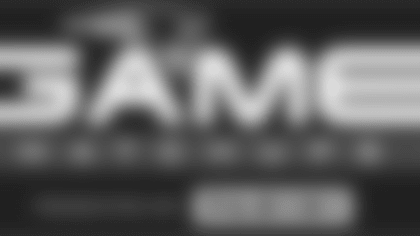WHEN THE PATRIOTS RAN

The Jets entered the game with one of the top run defenses in football and the Patriots were playing their first game without lead back Stevan Ridley. Based on that it didn't figure the Patriots would muster much on the ground, and they didn't. Using the run as little more than an occasional change of pace, New England picked up just 63 yards on 15 carries, which translates to a decent 4.2-yard average. Most of those runs came out of spread formations against the Jets sub defense, though, and Shane Vereen (11 carries, 43 yards) wasn't able to make many plays. The Jets did a good job of funneling the ball carrier into traffic and preventing Vereen from getting to the second level. At the end of the game when the Patriots tried to run out the clock, they managed 1 yard on three carries – two from Vereen and one from practice squad call-up Jonas Gray (3 carries, 12 yards). Not much going on here. EDGE: JETS
WHEN THE JETS RAN

Total. System. Failure. The Patriots were flat out dominated in this area and it nearly cost them the game. New York is a ground-oriented offense and despite that the Jets were able to run it effectively from start to finish. New York wound up with 218 yards on 43 carries for an average of 5.1 yards per rush, and 25 of 36 attempts (excluding Geno Smith scrambles) resulted in efficient runs (4 yards or more, first down, TD). Chris Ivory ran hard and was a going concern. He finished with 107 yards on 21 carries (5.1-yard average) and Chris Johnson spelled him in the second half by adding 61 yards on 13 attempts (4.7-yard average). Both appeared on the verge of breaking one big in the fourth quarter during the Jets final touchdown drive as the Jets really wore down a Patriots front trying to get by without Jerod Mayo. Dont'a Hightower and Jamie Collins each made 13 tackles but were consistently pushed off the line of scrimmage while the Vince Wilfork-led front failed to create much push. Even Smith consistently took advantage of poor pass rush discipline and added 37 yards on seven scrambles. There were no huge plays (New York's longest run went for 16 yards) to skew the numbers; this was just individual battles that the Jets consistently won. EDGE: JETS
WHEN THE PATRIOTS PASSED

The Patriots game plan called for a lot of quick throws early in an effort to help out the offensive line, which was once again without Dan Connolly and Bryan Stork. Early on it seemed to work, particularly when Tom Brady deftly bought some time on the first series before hitting a wide open Vereen for a 49-yard touchdown off a blown coverage. Vereen added another touchdown and finished with five catches for 71 yards. But as the game wore on the Jets front slowly started to add pressure, and Brady was frequently forced to throw the ball away or quicker than he would have liked. While the completion percentage took a hit as a result, Brady still managed some terrific throws under pressure. His improvised back shoulder touchdown pass to Danny Amendola on third-and-19 was a thing of beauty for both parties and ultimately provided the margin of victory. Rob Gronkowski was once again a factor with five catches for 68 yards and Brandon LaFell chipped in nicely with four for 55. Brady's final line of 20 of 37 for 261 yards and three touchdowns translated to a 103.5 passer rating, which was tremendous considering the heat he took. EDGE: PATRIOTS
WHEN THE JETS PASSED

With all of the success the Jets enjoyed on the ground they didn't need to throw it all that much but when Smith did he usually found and open target. He completed 20 of 34 passes for 226 yards with a touchdown that could have tied the game if not for one of his few misfires when he overthrew an open Jace Amaro on the two-point conversion. Smith had lots of time in the pocket and when he didn't like what he saw he ran effectively for first downs. Eric Decker took on Darrelle Revis and Smith didn't look his way much but the two connected four times for 65 yards including a couple of key third downs. Brandon Browner made his debut and played about half the snaps while committing a pair of holding penalties. Covering tight ends again proved to be problematic as Jeff Cumberland (three catches, 50 yards, 1 TD) and Amaro (3 for 22) found openings in the middle of the field. Those numbers would be better if not for a bad drop by Amaro around the 10-yard line in the first quarter. On the final drive the Jets moved 48 yards in 1:01 without any timeouts and got in position to try a 58-yard field goal. Overall the coverage was not strong but considering the manpower New England needed to employ to stop the run that probably shouldn't be a big surprise EDGE: JETS
SPECIAL TEAMS

Amendola replaced Patrick Chung as the lead kick returner and made an immediate impact. While he didn't break any of his four attempts, he averaged a solid 26.3 yards with a long of 31 and consistently made the first wave of tacklers miss. He showed a nice burst with the ball in his hands. He also recovered the Jets onside kick late in the game that forced New York to go the length of the field to win it. But the key play here came at the buzzer when Chris Jones blocked Nick Folk's 58-yard field goal to clinch the win. It was Folk's only miss of the night (among five attempts) and first of the season. Without Jones' block we may be singing a much different tune. Each punter had a bad shank among their otherwise solid work, and Walter Powell ripped off a 62-yard kick return in the second quarter to set up a field goal. The Patriots coverage was otherwise stout, and Jones' heroics alone keyed the victory. EDGE: PATRIOTS





























